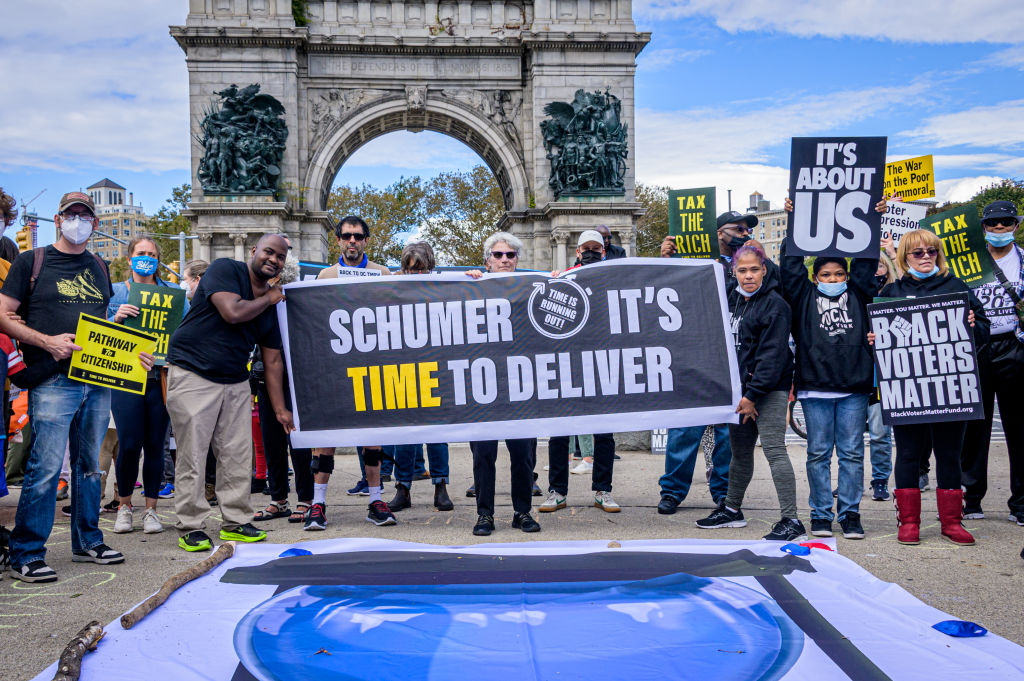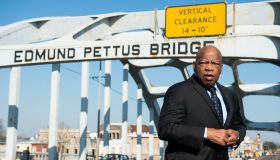Freedom To Vote Act: 5 Things To Know About Voting Rights Legislation
Freedom To Vote Act: 5 Things To Know About The Landmark Voting Rights Legislation

Source: Erik McGregor / Getty
Faced once again with an opportunity to take action on voting rights, the Senate is scheduled for a procedural vote on the Freedom to Vote Act on Wednesday. Led by Democratic Sens. Amy Klobuchar and Joe Manchin, the Freedom to Vote Act is a compromise born out of the necessity of voting rights reforms to maintain the American standard of Democracy.
Wednesday’s vote is simply about whether the Senate will debate the recently introduced voting rights legislation. Republicans previously filibustered similar attempts to discuss the For the People Act.
Having an honest discussion about the direction of Democracy, not a final vote on passing the legislation itself, should be a given. With more than 400 bills restricting voting rights introduced this year alone and documented issues in the eight years since the Shelby v. Holder case, Democrats say it is undeniable that action is mission-critical.
During floor remarks ahead of the vote, Senate Majority Leader Chuck Schumer said the question at hand is pretty clear.
“Every Senator will have to answer a straightforward question,” Schumer said, asking: “Should the Senate be allowed to simply begin a debate on voting rights, as has been done many times throughout our history?”
Schumer also positioned the vote as a measure of values and commitment to democracy.
“Do the members of this chamber think protecting our Democracy is worthy of even a debate in the Senate? Senate Democrats think it absolutely is,” Schumer continued.
Here are five things to know about the Freedom to Vote Act:
It retains some of the major components of the For the People Act
A breakdown from the Brennan Center highlights the major parts of the new bill offering standardized federal guidelines for election administration and voting rights. Specific provisions include expanded early voting options, protections for vote-by-mail, and protections for voters with disabilities.
The bill also would restore voting rights to those formerly incarcerated for felonies. Another major component is removing partisan gerrymandering. Redistricting is currently underway, and numerous accounts have surfaced of maps that reflect actual population growth but political whims.
Another part of the legislation would be to make election day a federal holiday, expanding the number of people who would be off from work and able to vote.
Democrats made several concessions to get Manchin on board and to court Republicans to overcome the filibuster. It also has a scaled-back version of campaign finance provisions.
It protects election workers and officials from intimidation and harassment
Scenes from the 2020 election and the Georgia Senate runoff showed unprecedented harassment, threats, and intimidation of workers simply trying to count ballots and fulfill their election administration duties.
The bill incorporates an earlier provision introduced by Sen. Raphael Warnock to protect the workers and officials who run elections. Another provision of the bill would also prevent sham third-party interference in vote counting, as seen in places like Arizona.
https://twitter.com/derektisler/status/1449144422705344514?s=20
The Freedom To Vote Act has broad support outside of Congress
Much of the partisan gridlock around voting rights is limited to Congress itself and related party interests. A poll from Data for Progress showed the majority of voters across party, supported the Freedom to Vote Act.
Senate Republican support for the bill is questionable
While every Senate Democrat has rallied around the bill, sources suggest Republicans will once again hold the party line and vote against even moving the bill forward for discussion. An NPR report quoted Senate Minority Leader Mitch McConnell saying he hopes all Republicans hold the line against the vote.
It seems that Manchin, and others who put value in bipartisan action, have not been able to win over their colleagues on the other side of the aisle.
Wednesday’s vote on beginning debate on Freedom to Vote Act will still be at the whim of the filibuster if 10 Republicans do not join the Democratic caucus in voting to move the discussion forward.
It is a companion to the John Lewis Voting Rights Advancement Act
As with the For the People Act, comprehensive Democracy reform requires passing the John Lewis Voting Rights Advancement Act. Both the Freedom to Vote Act and the John Lewis Voting Rights Advancement Act address voter suppression yet in different ways.
Named for the late voting rights champion Rep. John Lewis, the VRAA not only restores the aspects of the Voting Rights Act gutted by Shelby but would prevent racial discrimination in voting.
SEE ALSO:
Strom Thurmond Filibustered Voting Rights. 64 Years Later, Advocates Want Senate Action
Rep. Jim Clyburn Wants Voting Rights Protected. Filibuster Be Damned.



















